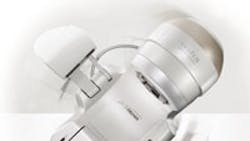IW50 Profile: Varian Medical Systems -- Varian Chief Offers Dose of Reality
A cancer treatment technology that can deliver radiation doses from many angles has become much faster and more cost-effective for hospitals and clinics thanks in part to Varian Medical Systems Inc. Less than a month after President Obama signed the United States' health care reform bill into law, the Palo Alto, Calif.-based X-ray and radiation products manufacturer introduced its next-generation stereotactic radiotherapy system.
The new product, called TrueBeam, is an upgrade to Varian's Trilogy system, increasing the delivery of monitor units per minute to 2,400 from 1,000, says Varian President and CEO Timothy Guertin. The efficiency improvements could prove to be more beneficial for Varian than originally anticipated. That's because the $2.2 billion company expects some increased costs from the health care reform law.
The federal plan will place a 2.3% excise tax on medical device sales starting in 2013. Varian may have to compensate for the tax with some product price increases and cost reductions, Guertin says. In addition, the increasing number of insured Americans could help Varian's business in the long run, but in the short term it could hurt business if the government pays for the newly insured by shifting costs from Medicare to private insurers, Guertin says.
"I'm expecting the next few years are going to be a little rocky. Somewhere out in 2013 or 2014 we're going to start to see this stabilize into some type of normalcy, so certain things are going to get better this year. Some things won't get better for a few years," Guertin says.
The company will look to build momentum off a strong 2010 start. Varian's first-quarter net income was $78.8 million, a 14.5% increase over the year-earlier period. Revenues rose 6% to $541 million. Varian was scheduled to announce its second-quarter earnings on April 28.
Varian's newly released TrueBeam radiotherapy delivery system. The product is an upgrade to its Trilogy system.
Another technology that Guertin says positions the company for future growth is the flat-panel X-ray product segment. Varian produces flat-panel digital detectors for filmless X-ray imaging, which has become the company's fastest-growing market segment, according to spokesman Spencer Sias. Over a four-year period, Varian's flat-panel business revenues have grown to $140 million from $17 million, Sias says.
Guertin believes filmless X-ray imaging will eventually replace traditional X-ray negatives. "Film is going away in medicine just like it is everywhere else," Guertin says. The digital images allow doctors and other health-care providers the opportunity to see the image immediately rather than waiting for the film to develop. The technology also provides improved image quality over that of image-intensifier tubes used in film X-rays, Guertin says.
At the plant level, Varian has included operations personnel in a process known as "design for manufacturing." Plant workers collaborate with engineers to build equipment so parts are more accessible during the assembly process. The company also incorporates self-testing devices in certain products to reduce quality-check and servicing costs, Guertin says.
"What we think is going to happen is as the developing world sees longer lifespans, they're going to see more patients who require advanced medical treatment, so we expect the developing world to become a bigger and bigger location for us."
-- Timothy Guertin, President and CEO, Varian
IndustryWeek selects the IW 50 Best Manufacturing companies each year based on a formula applied to the IW U.S. 500 list of the largest publicly held manufacturers in the country. View all IW 50 manufacturers and associated content. Interested in information related to this topic? Subscribe to our weekly Leadership Insights From The IW 50 eNewsletter.
About the Author
Jonathan Katz
Former Managing Editor
Former Managing Editor Jon Katz covered leadership and strategy, tackling subjects such as lean manufacturing leadership, strategy development and deployment, corporate culture, corporate social responsibility, and growth strategies. As well, he provided news and analysis of successful companies in the chemical and energy industries, including oil and gas, renewable and alternative.
Jon worked as an intern for IndustryWeek before serving as a reporter for The Morning Journal and then as an associate editor for Penton Media’s Supply Chain Technology News.
Jon received his bachelor’s degree in Journalism from Kent State University and is a die-hard Cleveland sports fan.
